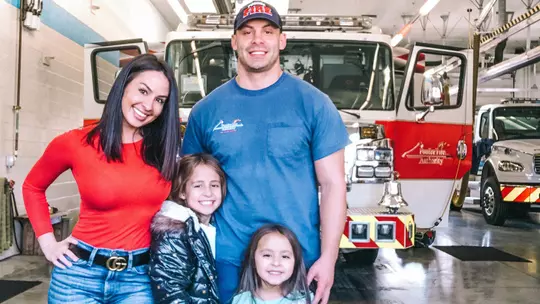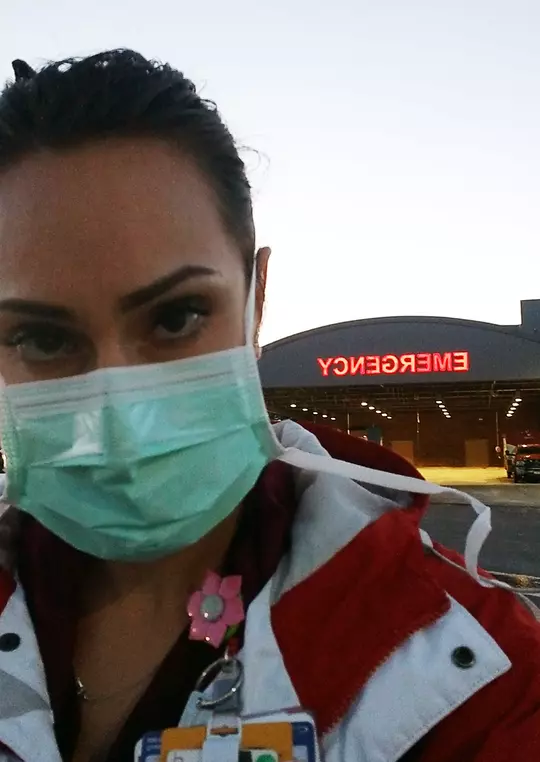
Healing the Community, Protecting Their Family
Former Ram athletes seeing effects of coronavirus at work
Mike Brohard
For his week off, Dr. Greg Myers and his family were headed to Costa Rica.
Instead, Colorado State’s legendary safety and Jim Thorpe Award winner undertook a home project.
He set himself up a quarantine room.
“I’ve already set up a separate area in our house. I have a room in my house, my weight room, which is perfect for me,” said Dr. Myers, an anesthesiologist who is in a high-risk position while helping the community he serves during the COVID-19 pandemic. “I have a closet in there, I’ve already set up a bed, I’ve set up things so I can clean off easily. I have a separate area where I can come in the back door, and I have a little fridge I can stock with little things, and I’ll leave from the back door and come and go that way if I get quarantined or I am exposed to high risk.
“I’ll be calling, ‘Hi honey, I’m home, I may need you to bring me some food and drop it off.’”
Working with Colorado Permanente Medical Group, he serves Kaiser Permanente members near his Denver-area home, with his base being Saint Joseph Hospital. For Dr. Myers and others in the medical/first responder professions, it’s a balance of serving the community and keeping those around you safe.
They are the front line in the fight, but there are others – workers at grocery stores, restaurants and delivery services – who don’t know if daily they have come in contact with someone who may be infected.
This is something new to all of them, and while the base rules remain – practice social distancing, wash your hands regularly and thoroughly, don’t touch your face and avoid touching surfaces – the game plan is continually changing.
They also have families and roommates they are trying to protect, and they go home to them after work. Former CSU football player Travis Garcia is trying to be mindful of his two families – the nine people in Fire Station 1 in Fort Collins, and his wife and two daughters at the family home. The pandemic has raised the bar of concern.
“In our fire house, there’s an engine company, which is three people; a truck company, which is four people; a battalion chief and safety officer,” Garcia explained. “That’s nine in a house for 48 hours, all running different calls and coming back to the station. We’re trying to minimize how we’re exposed in terms of cleanliness, keeping the stations clean and trying not to carry anything potentially harmful back into the house.
“Then you come home, and I’m really mindful now before I come home to shower well and come in as clean as possible. In a situation like this, if you do bring it into your house where you’re self-quarantined for four days, that’s not good for anyone. It’s not a perfect world, and there’s not a perfect solution.”

Key for them all is the personal protection equipment (PPE) they have, which they are trying to maximize with supplies running thin. Autumn Gardner, CSU’s record holder in the outdoor high jump, is an Emergency Medical Technician working as an Emergency Room Tech at Medical Center of the Rockies in Loveland. She is seeing an influx of patients every day, with each one being assessed as to whether or not they are a potential coronavirus patient.
While she said many people are avoiding ERs for the normal ailments they generally see, most every patient coming to them is for the virus.
“We’re increasing in acuity; people bold enough to come in are actually really sick,” Gardner said. “It is hectic. I think our biggest issue is our PPE. Right now, the mask situation is our worst, because we’re required to wear them at all times and we’re running out of them, especially the N95 masks. They’re supposed to be single-use with our coronavirus rule-out patients, but every patient who walks in the door is a coronavirus rule-out patient, and those N95 masks, you can only wear for those patients once, so we’re tossing those like nothing. Our biggest problem in the ER right now is protective equipment.”
Being prominent in the care and prevention of the coronavirus, and doing their part to flatten the curve, is not a detriment to the care and service they provide. Like most of the country, the wave of information hit them in the same manner, though they may have received it a few days prior.
Dr. Myers knows the same concerns the public has are shared by those treating them.
“It’s a scary time right now, not just for the health field, but for everybody. This is something new for everybody,” he said. “It’s a balance, and as far as health care in the hospital, right now it’s prep work. A lot of people may think we’re going overboard here, and actually, we probably haven’t done enough and we didn’t do it soon enough. It’s hard to try to comprehend. If you talked to me two weeks ago, it would have been a different story.
“Literally, I went to a meeting and it was a gathering of all my anesthesia partners, what we’ve seen, when it will get here and how it’s progressed, it was, ‘whoa, wait a second.’ I had a partner who had texts from other countries, and those texts were from Europe, and it was holy moly. I think right now, we’re doing our best to gather all the equipment and figure out ways we can best treat patients, and that’s the biggest thing right now for us as health-care providers.”
In a situation like this, if you do bring it into your house where you’re self-quarantined for four days, that’s not good for anyone. It’s not a perfect world, and there’s not a perfect solution.Travis Garcia, Poudre Fire Authority
Gardner feels she is the perfect person to be in the emergency room right now providing care. At 25 and in good health, she has one roommate, both living on different floors of their apartment.
She said she is not in the primary-target group, that, should she contract it, it isn’t supposed to hit her as hard. Still, the idea is what concerns all first responders right now, because if they contract the highly contagious virus, it can spread along those lines in short order, creating more problems for those seeking care.
As an anesthesiologist, Dr. Myers knows he’s in a very vulnerable position. All of them always have safety guards in place, but they are all paying particular attention during the pandemic so as not to magnify the problem.
“It’s kind of twofold. When our health care workers start to get sick, we’re in big, big trouble,” Gardner said. “Not only do you lose those people in your workforce, but you’re contagious before you’re symptomatic. You can think you’re fine, but you’re the carrier spreading it to everybody else. If our work force gets sick, we’re in big, big trouble.”
Like his fellow Rams, former track athlete Sam Little interacts with the public throughout his shift as a Greeley police officer. What he makes clear is, unlike those who deal constantly with public safety and medical issues, his primary tasks don’t necessarily put him at consistent risk with the virus.
It can. A driver he may pull over for a traffic violation may be a carrier, so, like the others, he is taking precautions with his PPE. With his job, he must consider the factors, but it hasn’t altered his day-to-day job priorities, explaining the nature of being a police officer could put him in dangerous situations with more immediate impacts.
“As far as protecting family and friends I’m around, that’s basically what I’m doing by protecting myself,” Little said. “This is not to the level of what I’ve personally experienced in this job. It adds everything to it, because it affects so many people, and they have so many questions we just don’t have answers to. That’s the biggest issue right now is we just don’t really have answers.
“Me personally, I’m not super afraid of it, because of the precautions we take and other personal experiences that are a lot more severe.”
Logic, he said, is fueling decisions these days. Calls which can be handled by phone are, limiting personal interactions. On patrol, he does his best to educate the public with the information he is given by the department, and those questions are coming in greater number.
Each one of them have seen layers of precaution added to the daily routine to help minimize the risk of spreading the virus, to fellow employees and the general population they serve. To a person, they all expressed what the country is feeling – these are unchartered waters.
All entered professions with inherent risks, and they are all proud of the work they do, especially now. Still, this pandemic carries more meaning to the idea of making sure you don’t bring work home.
“We’re just trying to minimize that risk to ourselves and our families. With this, you go to a car accident, a fire, a gas leak, and once you come home, you’re kind of away from that,” Garcia said. “Here, it’s a little bit of a different situation. We want to be really careful we’re not bringing this back into our own home, which is probably the most unnerving part of it all.”
